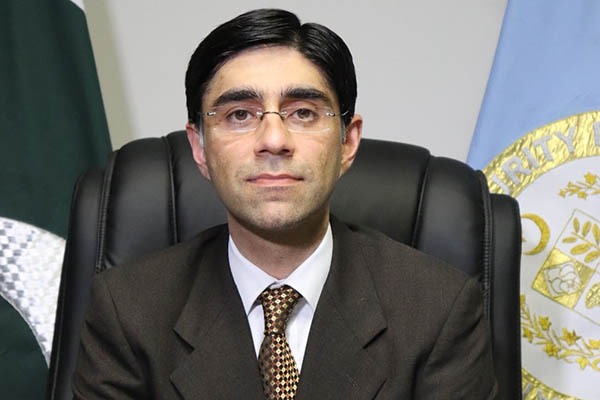
National Security Adviser Moeed Yusuf. Photo courtesy Islamabad Policy Research Institute
In interview, NSA says Washington and Islamabad need to fix bilateral relationship so they can work together in war-torn state
Following the Taliban’s takeover of Afghanistan, the group is most concerned with assistance and recognition, which grants Western states a lot more leverage over it than Pakistan, National Security Adviser Moeed Yusuf has claimed.
“Now that the Taliban has the whole country, they don’t really need Islamabad as much anymore,” he told the Washington Post in an interview. “Assistance and recognition is the leverage. Who has that? It’s the Western countries that have much more leverage in Afghanistan than Pakistan,” he added, and pointed the finger at the U.S.-supported government in Kabul over scapegoating Pakistan to hide its own ineptitude, corruptions and unpopularity.
“Did Pakistan tell the Afghan National Army not to fight? Did Pakistan tell Ashraf Ghani to run away?” he said. “The entire state collapsed in a week. So somebody was lying, somebody was misreporting, or somebody was mistaken about the reality and when it came to informing the taxpayers of the Western world,” he said.
The NSA reiterated his concerns with the relationship between Pakistan and the U.S., questioning why the two were not simpatico over their shared interests in Afghanistan. “Right now, in the situation we are in, how are U.S. and Pakistan’s interests not aligned?” he said. “I’m not asking for any sympathy for Pakistan. I’m thinking in terms of pure U.S. selfish national interests. How does it help to push away a country of this size, stature and power?” he said, adding that the two needed to fix their bilateral ties.
Yusuf said Pakistan wanted the United States to increase its diplomatic and economic involvement in Afghanistan and to find a way forward to engage diplomatically with the Taliban. “The United States should not isolate Afghanistan to punish its new rulers,” he said, adding that any security vacuum would allow terrorist organizations to take root again, leading to more terrorism, refugees and economic hardship for Pakistan. “We teamed up with the U.S. to fight back [after 9/11] and after that there is a major backlash on Pakistan,” he said, adding, “But let’s let all that pass. We need to work out how to move forward as partners, because neither side can do without the other in terms of stability in the region.”
The NSA also stressed that the U.S.-Pakistan relationship can’t be just about Afghanistan as the two countries share a much broader range of interests. But first, he said, the United States must learn the lessons of the 1990s, when it had abandoned Afghanistan. “Otherwise it can expect a similar outcome,” he warned.
U.S. intelligence has repeatedly pointed the finger at elements of the Pakistani military and intelligence, claiming they have supported the Taliban through safe havens for years; a charge the civilian leadership denies. The Human Rights Watch has claimed this support included funding, diplomatic support, recruiting and training of Taliban fighters, providing the Taliban arms and even direct combat support.
